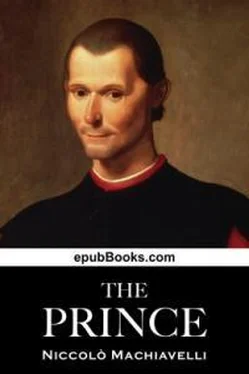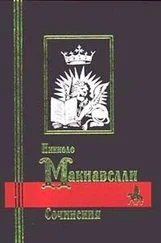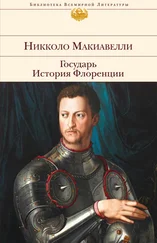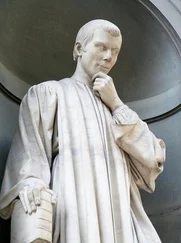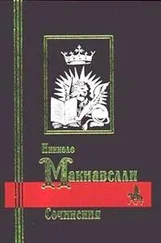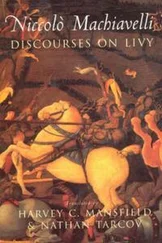But the scanty wisdom of man, on entering into an affair which looks well at first, cannot discern the poison that is hidden in it, as I have said above of hectic fevers. Therefore, if he who rules a principality cannot recognize evils until they are upon him, he is not truly wise; and this insight is given to few. And if the first disaster to the Roman Empire [33] "Many speakers to the House the other night in the debate on the reduction of armaments seemed to show a most lamentable ignorance of the conditions under which the British Empire maintains its existence. When Mr Balfour replied to the allegations that the Roman Empire sank under the weight of its military obligations, he said that this was 'wholly unhistorical.' He might well have added that the Roman power was at its zenith when every citizen acknowledged his liability to fight for the State, but that it began to decline as soon as this obligation was no longer recognized."—Pall Mall Gazette, 15th May 1906.
should be examined, it will be found to have commenced only with the enlisting of the Goths; because from that time the vigour of the Roman Empire began to decline, and all that valour which had raised it passed away to others.
I conclude, therefore, that no principality is secure without having its own forces; on the contrary, it is entirely dependent on good fortune, not having the valour which in adversity would defend it. And it has always been the opinion and judgment of wise men that nothing can be so uncertain or unstable as fame or power not founded on its own strength. And one's own forces are those which are composed either of subjects, citizens, or dependents; all others are mercenaries or auxiliaries. And the way to make ready one's own forces will be easily found if the rules suggested by me shall be reflected upon, and if one will consider how Philip, the father of Alexander the Great, and many republics and princes have armed and organized themselves, to which rules I entirely commit myself.
Chapter XIV
That Which Concerns a Prince on the Subject of the Art of War
A prince ought to have no other aim or thought, nor select anything else for his study, than war and its rules and discipline; for this is the sole art that belongs to him who rules, and it is of such force that it not only upholds those who are born princes, but it often enables men to rise from a private station to that rank. And, on the contrary, it is seen that when princes have thought more of ease than of arms they have lost their states. And the first cause of your losing it is to neglect this art; and what enables you to acquire a state is to be master of the art. Francesco Sforza, through being martial, from a private person became Duke of Milan; and the sons, through avoiding the hardships and troubles of arms, from dukes became private persons. For among other evils which being unarmed brings you, it causes you to be despised, and this is one of those ignominies against which a prince ought to guard himself, as is shown later on. Because there is nothing proportionate between the armed and the unarmed; and it is not reasonable that he who is armed should yield obedience willingly to him who is unarmed, or that the unarmed man should be secure among armed servants. Because, there being in the one disdain and in the other suspicion, it is not possible for them to work well together. And therefore a prince who does not understand the art of war, over and above the other misfortunes already mentioned, cannot be respected by his soldiers, nor can he rely on them. He ought never, therefore, to have out of his thoughts this subject of war, and in peace he should addict himself more to its exercise than in war; this he can do in two ways, the one by action, the other by study.
As regards action, he ought above all things to keep his men well organized and drilled, to follow incessantly the chase, by which he accustoms his body to hardships, and learns something of the nature of localities, and gets to find out how the mountains rise, how the valleys open out, how the plains lie, and to understand the nature of rivers and marshes, and in all this to take the greatest care. Which knowledge is useful in two ways. Firstly, he learns to know his country, and is better able to undertake its defence; afterwards, by means of the knowledge and observation of that locality, he understands with ease any other which it may be necessary for him to study hereafter; because the hills, valleys, and plains, and rivers and marshes that are, for instance, in Tuscany, have a certain resemblance to those of other countries, so that with a knowledge of the aspect of one country one can easily arrive at a knowledge of others. And the prince that lacks this skill lacks the essential which it is desirable that a captain should possess, for it teaches him to surprise his enemy, to select quarters, to lead armies, to array the battle, to besiege towns to advantage.
Philopoemen, [34] Philopoemen, "the last of the Greeks," born 252 B.C., died 183 B.C.
Prince of the Achaeans, among other praises which writers have bestowed on him, is commended because in time of peace he never had anything in his mind but the rules of war; and when he was in the country with friends, he often stopped and reasoned with them: "If the enemy should be upon that hill, and we should find ourselves here with our army, with whom would be the advantage? How should one best advance to meet him, keeping the ranks? If we should wish to retreat, how ought we to pursue?" And he would set forth to them, as he went, all the chances that could befall an army; he would listen to their opinion and state his, confirming it with reasons, so that by these continual discussions there could never arise, in time of war, any unexpected circumstances that he could not deal with.
But to exercise the intellect the prince should read histories, and study there the actions of illustrious men, to see how they have borne themselves in war, to examine the causes of their victories and defeat, so as to avoid the latter and imitate the former; and above all do as an illustrious man did, who took as an exemplar one who had been praised and famous before him, and whose achievements and deeds he always kept in his mind, as it is said Alexander the Great imitated Achilles, Caesar Alexander, Scipio Cyrus. And whoever reads the life of Cyrus, written by Xenophon, will recognize afterwards in the life of Scipio how that imitation was his glory, and how in chastity, affability, humanity, and liberality Scipio conformed to those things which have been written of Cyrus by Xenophon. A wise prince ought to observe some such rules, and never in peaceful times stand idle, but increase his resources with industry in such a way that they may be available to him in adversity, so that if fortune chances it may find him prepared to resist her blows.
Chapter XV
Concerning Things for Which Men, and Especially Princes, Are Praised or Blamed
It remains now to see what ought to be the rules of conduct for a prince towards subject and friends. And as I know that many have written on this point, I expect I shall be considered presumptuous in mentioning it again, especially as in discussing it I shall depart from the methods of other people. But, it being my intention to write a thing which shall be useful to him who apprehends it, it appears to me more appropriate to follow up the real truth of the matter than the imagination of it; for many have pictured republics and principalities which in fact have never been known or seen, because how one lives is so far distant from how one ought to live, that he who neglects what is done for what ought to be done, sooner effects his ruin than his preservation; for a man who wishes to act entirely up to his professions of virtue soon meets with what destroys him among so much that is evil.
Читать дальше
